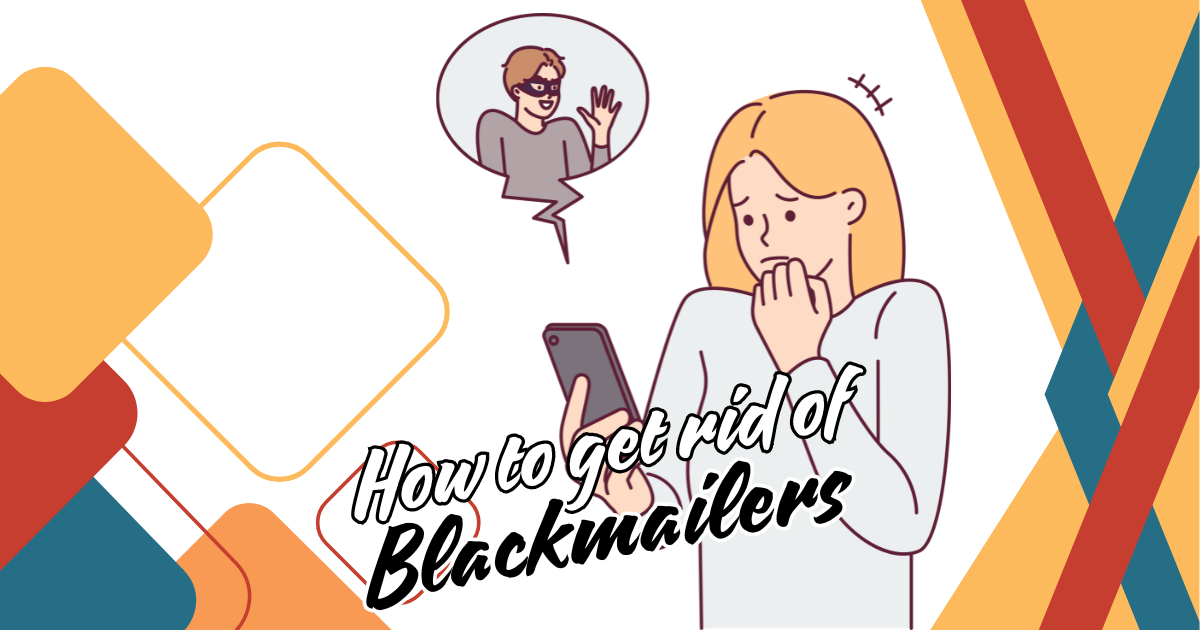Blackmail is a serious issue that can cause emotional stress, financial loss, and damage to one’s reputation. Whether it’s someone threatening to expose your private information, a past mistake, or a sensitive photo, knowing how to get rid of blackmailers is essential for safeguarding your well-being. In this guide, we’ll explore actionable steps, legal options, and preventive measures to handle blackmail situations safely.
1. Understanding Blackmail: What It Is and Why It Happens
Blackmail is a form of extortion where an individual threatens to reveal private or damaging information unless a demand is met, usually involving money or favors. This manipulative tactic can occur in many forms, such as:
- Personal Blackmail: Using private photos, videos, or information to gain leverage.
- Financial Blackmail: Threatening to disclose financial details or debts.
- Online Blackmail: Involving hacking, cyber threats, or compromising social media accounts.
Blackmail typically happens because the perpetrator believes they have control over you. It can be committed by someone close, an acquaintance, or a complete stranger. Understanding why blackmail happens is the first step toward taking appropriate action.
2. 7 Effective Steps to Get Rid of Blackmailers Safely
Dealing with a blackmailer requires a calm and strategic approach. Here are seven effective steps to safely handle and get rid of blackmailers:
Step 1: Do Not Respond Immediately
Your first reaction may be to respond in panic or meet the blackmailer’s demands. Avoid this. Instead, take a moment to compose yourself. Reacting impulsively can make the situation worse.
Step 2: Document Everything
Start gathering evidence. Save all communication with the blackmailer, including emails, text messages, or social media messages. If the threats are verbal, try to record the conversations if legally allowed. Documentation will be crucial if you decide to take legal action.
Step 3: Do Not Give in to Their Demands
Giving in to the demands only empowers the blackmailer. Even if you meet their current request, they may continue to make more demands. Refusing to give in reduces their power over you.
Step 4: Do Not Delete Any Evidence
It’s tempting to delete embarrassing or sensitive information, but don’t. This data can serve as valuable evidence if you need to file a report or take legal action.
Step 5: Secure Your Accounts and Personal Information
Change your passwords, enable two-factor authentication, and strengthen your online security. Notify your bank if financial information is at risk. Blackmailers often try to access other personal data to increase their leverage.
Step 6: Report the Blackmailer to Authorities
In many cases, blackmail is a criminal offense. Report the incident to local law enforcement or cybercrime units. Provide them with all the evidence you’ve collected to support your case.
Step 7: Consult a Legal Professional
If the blackmail is complex or involves sensitive information, seek the help of a legal expert. Lawyers can offer guidance on how to protect your rights and pursue legal actions against the perpetrator.
3. Legal Actions You Can Take Against Blackmailers
When facing blackmail, it’s essential to know your legal rights and options. Blackmail is illegal in most countries and can result in severe penalties for the offender. Here’s what you can do:
- File a Police Report: Gather all your evidence and file a detailed report with your local law enforcement. This is particularly effective for cases involving physical threats or large sums of money.
- Get a Cease-and-Desist Letter: A lawyer can draft a cease-and-desist letter, warning the blackmailer of the legal consequences if they continue their actions.
- Pursue Civil Litigation: If the blackmailer has caused financial or reputational harm, you may have grounds to sue for damages. This option is best pursued with the help of an experienced attorney.
If you feel threatened, always prioritize your safety and cooperate with law enforcement officials.
4. How to Handle Online Blackmail: What to Do and What to Avoid
Online blackmail, also known as cyber extortion, has become increasingly common with the rise of social media and digital communication. Here’s how to handle online blackmail safely:
What to Do:
- Report the Incident to the Platform: Social media sites, messaging apps, and email providers often have policies against blackmail. Report the blackmailer’s account and provide evidence.
- Block the Blackmailer: Blocking the blackmailer can prevent further communication, although it’s crucial to document everything first.
- Reach Out to a Cybercrime Helpline: Many countries have cybercrime helplines that offer guidance and support for victims.
What to Avoid:
- Do Not Send Any Money: Cyber extortionists often ask for money, but paying them doesn’t guarantee they’ll stop. It may encourage further demands.
- Avoid Engaging with the Blackmailer: Engaging in conversations can provide them with more ammunition to manipulate you. Keep communication to a minimum.
5. How to Respond to Blackmail Threats: Dos and Don’ts
When you’re faced with a blackmail threat, knowing how to respond is critical. Here are some dos and don’ts:
Dos:
- Stay Calm: Keep a level head to think clearly.
- Gather Evidence: Collect and store all forms of communication.
- Seek Support: Talk to someone you trust, such as a friend, family member, or counselor.
Don’ts:
- Don’t Panic: Panic can cloud your judgment and lead to poor decisions.
- Don’t Respond Emotionally: Avoid angry or emotional responses that the blackmailer can use against you.
- Don’t Destroy Evidence: This will hinder any potential investigation.
6. Protect Yourself from Future Blackmail Attempts
Once you’ve dealt with a blackmailer, it’s essential to take preventive measures to protect yourself from future incidents. Here’s how:
- Strengthen Online Privacy: Review your social media privacy settings, and limit what you share publicly.
- Avoid Sharing Sensitive Information: Never share compromising photos, videos, or personal information, even with people you trust.
- Use Secure Communication Channels: Opt for encrypted messaging apps and avoid using public Wi-Fi for sensitive communication.
By being proactive, you can reduce the risk of becoming a target again.
7. 5 Blackmail Prevention Techniques Everyone Should Know
Prevention is always better than cure. Here are five techniques to prevent falling victim to blackmail:
- Secure Your Digital Presence: Use strong, unique passwords for all your accounts.
- Be Cautious When Sharing Information: Avoid oversharing personal information online.
- Monitor Your Online Reputation: Regularly search for your name to spot any false information or breaches.
- Educate Yourself About Phishing Scams: Stay informed about common online scams and tactics used by blackmailers.
- Create a Support Network: Having people to turn to can provide emotional and practical support during a blackmail situation.
8. How to Get Professional Help for Dealing with Blackmail
If the situation feels overwhelming, professional help can provide guidance and support. Here’s where to turn:
- Cybercrime Specialists: These experts can track down online blackmailers and help secure your digital presence.
- Legal Advisors: Lawyers specializing in extortion and cybercrime can provide legal protection and represent you in court if needed.
- Support Groups: Victim support groups offer emotional support and resources for dealing with blackmail.
Seeking professional help not only empowers you but also ensures that you’re taking the right steps.
9. FAQs: Common Questions About How to Get Rid of Blackmailers
1. Is blackmail a criminal offense?
Yes, blackmail is a criminal offense in most jurisdictions and can lead to severe legal consequences for the perpetrator.
2. What should I do if I’m being blackmailed online?
Document all communications, secure your accounts, and report the incident to the platform and local authorities.
3. Can I block a blackmailer?
Yes, but only after gathering sufficient evidence. Blocking too early may prevent you from collecting vital information.
4. Should I pay the blackmailer?
No, paying the blackmailer rarely resolves the issue and may encourage them to make further demands.
5. What legal actions can I take?
You can file a police report, get a cease-and-desist order, or pursue civil litigation with the help of a lawyer.
6. How do I know if the blackmailer will follow through?
There’s no guarantee. Blackmailers often bluff to scare their victims, but it’s best to assume they will follow through and take action.
7. How do I protect my social media accounts?
Enable two-factor authentication, use strong passwords, and limit the amount of personal information shared publicly.
8. Can blackmailers be traced?
Yes, with the help of law enforcement or cybersecurity experts, blackmailers can often be traced, especially in digital cases.
9. What should I do if the blackmailer is someone I know?
Seek legal help immediately. Confronting them alone can be risky, and professional guidance will ensure your safety.
10. Can therapy help with the emotional impact of blackmail?
Yes, therapy can be beneficial for dealing with the emotional stress and anxiety caused by blackmail.
Conclusion: Take Action to Protect Yourself from Blackmail
Dealing with blackmail can be overwhelming, but taking the right steps can protect your reputation, finances, and mental well-being. By staying calm, documenting evidence, securing your digital presence, and seeking legal assistance, you can regain control and ensure the blackmailer is held accountable. Remember, you don’t have to face this alone—reach out to law enforcement, professionals, and support networks for help.
Preventive measures and vigilance are key to safeguarding yourself from future blackmail attempts. Stay informed, stay safe, and never hesitate to seek help if you’re in a threatening situation.




